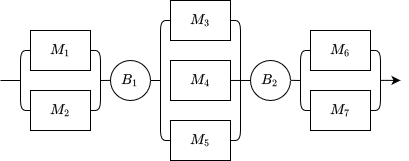Examples
Additional examples can be found in the Github repository under simantha/examples.
Single Machine Degradation
The following example implements a single machine that is subject to Markovian degradation.

import random
from simantha import Source, Machine, Sink, System, utils
degradation_matrix = [
[0.9, 0.1, 0., 0., 0. ],
[0., 0.9, 0.1, 0., 0. ],
[0., 0., 0.9, 0.1, 0. ],
[0., 0., 0., 0.9, 0.1],
[0., 0., 0., 0., 1. ]
]
source = Source()
M1 = Machine(
name='M1',
cycle_time=1,
degradation_matrix=degradation_matrix,
cm_distribution={'geometric': 0.1}
)
sink = Sink()
source.define_routing(downstream=[M1])
M1.define_routing(upstream=[source], downstream=[sink])
sink.define_routing(upstream=[M1])
system = System([source, M1, sink])
random.seed(1)
system.simulate(simulation_time=utils.WEEK)
# Output:
# Simulation finished in 0.34s
# Parts produced: 7963
Parallel Stations
In this example several machines are arranged in parallel to form stations. This arrangement is sometimes referred to as a series-parallel configuration.

from simantha import Source, Machine, Buffer, Sink, System, utils
source = Source()
M1 = Machine('M1', cycle_time=2)
M2 = Machine('M2', cycle_time=2)
station1 = [M1, M2]
B1 = Buffer(capacity=5)
M3 = Machine('M3', cycle_time=3)
M4 = Machine('M4', cycle_time=3)
M5 = Machine('M5', cycle_time=3)
station2 = [M3, M4, M5]
B2 = Buffer(capacity=5)
M6 = Machine('M6', cycle_time=2)
M7 = Machine('M7', cycle_time=2)
station3 = [M6, M7]
sink = Sink()
source.define_routing(downstream=station1)
for machine in station1:
machine.define_routing(upstream=[source], downstream=[B1])
B1.define_routing(upstream=station1, downstream=station2)
for machine in station2:
machine.define_routing(upstream=[B1], downstream=[B2])
B2.define_routing(upstream=station2, downstream=station3)
for machine in station3:
machine.define_routing(upstream=[B2], downstream=[sink])
sink.define_routing(upstream=station3)
objects = [source] + station1 + [B1] + station2 + [B2] + station3 + [sink]
system = System(objects)
system.simulate(simulation_time=utils.WEEK)
# Output:
# Simulation finished in 1.54s
# Parts produced: 10074